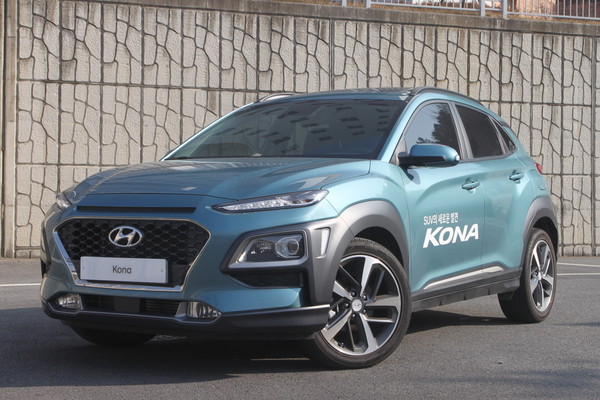Fires in the Kona Electric Vehicle (EV) are a sore spot for Hyundai Motor

Hyundai and Kia Motors have decided to reflect the quality costs of about 3.4 trillion won ($3 billion) in their third-quarter earnings, the companies said on Oct. 19.
Hyundai Motor and Kia Motors will set aside 2.13 trillion won ($1.8 billion) and 1.25 trillion won ($1.64 billion), respectively. The amount of provisions for quality assurance is the largest ever.
The decision to build up a large amount of recall-related provisions reflects the fact that the cost of the engine recall is higher than expected and that the period of operation of vehicles is significantly increasing.
"As the cost related to quality, such as recall due to engine defects, continued to be higher than expected in the third and fourth quarters of this year, we needed more than 3 trillion won in provisions until 2037. Another reason for the increase was the extension of the life cycle of a car, which is usually considered to be 12 years, to 19.5 years," Hyundai Motor said.
In other words, the company redefined the recall-related costs that could occur 17 years later until 2037, reflecting the company's performance in the third and fourth quarters of this year.
Hyundai Motor has been criticized for having many engine defects compared to its radically improved design and advanced convenience specification technologies.
Recent Grandeur engine defects and Genesis GV80 engine defects are typical. A series of fires in the Kona Electric Vehicle (EV) are also a sore spot for Hyundai Motor.
For instance, a fire broke out on Oct. 17 in a Kona electric vehicle (EV) of Hyundai Motor set up in the parking lot of the community center in Wabu-eup, Namyangju, Gyeonggi Province.
The fire was extinguished by 119 firefighters who were called in after burning part of the car and causing 25 million won (estimated by the fire department) in property damage.
The car that caught fire is 2018 model year, and it has been confirmed that the owner stopped the car at 10 p.m. the previous day at the parking lot of the community center in Wabu-eup and connected the charger cable.
Fire authorities said the fire is believed to have started while charging a car battery in an electric car charger.
Since its launch in 2018, Kona electric vehicles have reportedly had a total of 13 fires, including nine in Korea and four overseas. Recently, a Kona electric car that was being charged in Jeju Island on Sept. 26 and another Kona car in Daegu on Oct. 4 caught fire.
Due to a series of fires, Hyundai Motor has been taking corrective measures for 25,000 Kona electric vehicles since Oct. 16.
Meanwhile, due to the large-scale provision, the temporary deterioration of Hyundai Motor's performance is expected to be inevitable. Initially, the stock market expected Hyundai to post an operating profit of more than 1 trillion won in the March-April period, but the provision also raised the possibility of an operating loss.
In his inaugural message on Oct. 14, Hyundai Motor Chairman Chung Eui-sun vowed to carry out customer-centered management by mentioning "customers" more than nine times.
"The first step in customer happiness is to help customers focus on their own lives through perfect quality," Chung said at the time. "We want to realize our dream of safe and free movement and a peaceful life and share the fruits with all our customers around the world to become a beloved company."
Owing to a series of fires at Hyundai Motor's Kona EV, Korean electric vehicle makers are expected to have difficulty selling for the time being.
According to the Korea Automobile Importers and Distributors Association and the automobile industry, a total of 13,261 imported electric vehicles were sold this year until September, 8.5 times more than 1,552 during the same period last year.
In September alone, 2,237 units were sold, a 10-fold increase from the same month last year (229 units). Tesla is definitely leading the sales of imported electric vehicles. In September, 2,256 Tesla units were sold, accounting for 91.9 percent of the imported electric car sales. Tesla sales from January to September this year reached 10,518 units, accounting for 79.6 percent of the total.
Audi's e-tron 55 Quattro came in second with 601 units sold in September, while Renault Zoe ranked third with 128 units. The sales figure for Peugeot's e-208 and SUV-electric vehicle e-2008 were 34 and 43 units, respectively, and 23 units for Mercedes-Benz's EQC 4MATIC.
In contrast to the popularity of imported electric vehicles, domestic carmakers' electric cars are suffering from sluggish sales. Until September, a total of 13,505 electric cars were sold by domestic carmakers, down 40.9 percent from 22,842 in the same period last year. Kia's Niro EV saw a fall of 53.4 percent with 2,621 units sold until September, while Soul EVs posted a 78.4 percent decline with 298 units.
Hyundai Motor's Ioniq (1,274 units) fell 22.9 percent in sales, while the Kona (7,061 units) dropped by 36.5 percent. The Chevrolet Volt EV was -38.1 percent, or 1,462 units, and Renault Samsung Motors' SM3 Z.E. was -4.9 percent, or 661 units.
There is a possibility that the new car will revive the sentiment of purchasing domestic electric vehicles when it is released next year, but the decline will continue for some time due to a series of fires at Hyundai Motor's Kona EV, market watchers said.

